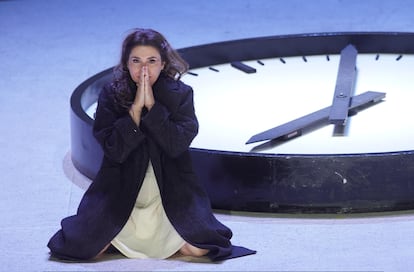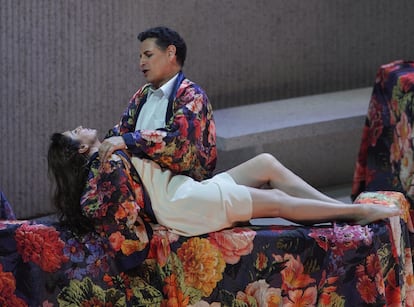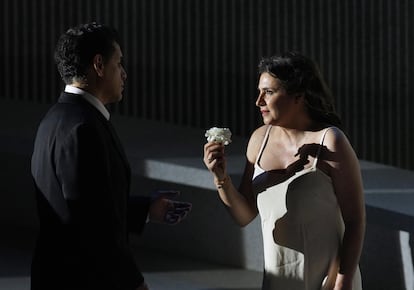Sabina Puértolas received a standing ovation after replacing Nadine Sierra in La Traviata at the last minute.

“Singing La traviata ,” aside from the ironic and colloquial expression, is an enormously difficult undertaking. Spanish soprano Sabina Puértolas knows this well, as last night she performed the La traviata of her life at the Teatro Real, where she replaced American star Nadine Sierra at the last minute, who was affected by vocal cord discomfort due to Madrid's dry heat. Puértolas last performed this popular Giuseppe Verdi title at the Teatro Villamarta in Jerez de la Frontera in May 2024, but last night she took to the stage of the Madrid coliseum without prior rehearsal and after watching a film of Willy Decker 's demanding stage production.
The Aragonese soprano (52 years old in Zaragoza) is no stranger to the Teatro Real audience, having participated in eleven productions since her debut in 2006 as Rosita in Luisa Fernanda by Moreno Torroba. However, she is a singer with astonishing courage and versatility when it comes to taking on the challenge of replacing a colleague in a production.
She did it in 2019 with Brenda Rae in Donizetti's L'elisir d'amore , and also with Lisette Oropesa in Il turco in Italia in 2023. The event most similar to last night's took place in January 2018, when she replaced Lucy Crowe in David McVicar's production of Verdi's Rigoletto at London's Covent Garden. "On that occasion, they called me when I was buying some football boots for my son at Carrefour, which had broken, and within a few hours I was on a plane to London," the singer recalled by phone on Monday morning.
In this case, Nadine Sierra's cancellation wasn't confirmed until this Sunday, the day of the performance, at 12:30 p.m. At that time, Puértolas had just arrived at the Plaza de Oriente parking lot from her home in Villafranca del Castillo, half an hour from Madrid. "They called me the night before to tell me that Nadine wasn't feeling well, but I was convinced that she wouldn't cancel in the end," continues the soprano, who was scheduled to fly to New York yesterday with her husband, a captain for Air Europa.
Joan Matabosch , artistic director of the Teatro Real, explained all the details of the replacement this morning via WhatsApp. “We had called Sabina in for a piano rehearsal in the morning, and after Nadine's cancellation was confirmed, a stage rehearsal was organized. She had to learn the extremely complicated production in record time. Her work ethic is impressive,” she admits. The singer adds that she was unfamiliar with the production and that the stage director's assistant gave her some stage directions while her costume was being fitted: “Afterwards, I asked to sleep for half an hour with my little blanket . When I woke up at four, I ate a mini ham and an apple, since my stomach was blocked. Then I watched the DVD of the Salzburg production, which Anna Netrebko sang.”

Matabosch is full of praise for the singer: “She managed to turn the audience's disappointment at not having the announced artist on stage into a tremendous personal triumph. There isn't enough praise to do justice to what she's done,” he admits. The atmosphere before the performance wasn't the most conducive, as many spectators were angry upon learning of Nadine Sierra's cancellation. “I had come for her and to see her with Juan Diego Flórez ,” one indignant spectator stated from a box seat.
In fact, the Teatro Real avoided an announcement over the PA system, and even included no note on the matter in the program; everything was limited to a comment on the website, a notice to season ticket holders, and a notice on the subtitle screens that read: "Soprano Nadine Sierra is suffering from an illness that prevents her from participating in the performance. The role of Violetta will be performed by Sabina Puértolas. The Teatro Real thanks her for her willingness to join at the last minute."
I start with nervesPuértolas began the first act, appearing visibly nervous on stage from the start of the prelude. However, this is the part of the role most suited to her light lyrical voice, and she was able to overcome the difficulties of stage movement with the help of the chorus and her partner, tenor Juan Diego Flórez, who was singing his third and final performance as Alfredo. The great Peruvian singer may not have the ideal timbre or volume for this role, but he brought it to his bel canto territory and fascinated the audience with admirable phrasing and nuances, from the beginning of the duet with Violetta in the first act, "Un dì, felice, eterea ." For her part, Puértolas was vocally confident in the final cabaletta , which she crowned with the famous high E flat, which Verdi never wrote but which is usually a good ending to warm up the audience.

During the intermission after the first act, complaints from some audience members asking for the name of the replacement could still be heard in the aisles. However, during the hour and a half of the second and third acts, which in this production are performed without a break, Puértolas ended up convincing everyone, perhaps in the part of the character that is most spinto and least suited to her voice. “Actually, I debuted as Violetta in 2001, but I have sung very few traviatas , unlike Gilda in Rigoletto . I sang it in 2012 in Liège, in 2024 in Jerez, and now at the Teatro Real. It's a character I hold very close, but I'm still in shock and can't believe what happened,” the singer admitted.
In the first scene of Act II, her theatrical chemistry with Flórez worked much better. But then, in her extended and dramatic duet with Germont, the Aragonese singer began to revel in her legato and pianissimo performances, aided by the magnificent acoustic projection of Wolfgang Gussmann's semicircular white stage set. She was the highlight of that act, with an excellent Amami, Alfredo , far superior to Flórez and the Albanian baritone Gëzim Myshketa, with Germont's warm, round voice at the center, who was widely applauded despite the difficulties he exhibited in the upper register. But she was also applauded by the dull conducting of the Hungarian maestro Henrik Nánási from the pit.
Puértolas carried the rest of the performance with admirable poise, turning the third act into something unforgettable. Her interpretation of the aria Addio del passato , exquisitely dolente e pianissimo , and especially the second verse, with ideal dramatic modulation, impressed the audience at the Teatro Real. The slight inaccuracies in the text or her rushed entrance mattered little here, as her interpretation elevated the poor orchestral accompaniment with a dedication that the audience was able to reward with one of the longest ovations ever remembered at the Madrid coliseum . The Spanish singer couldn't help but break out of character and, in tears, stood to acknowledge the applause and bravos that, for almost five minutes, were thunderous.

“It was an amazing moment, as I was wondering from the floor if what was happening was real,” the singer recalled. “I think the maestro wanted us to do an encore, but I couldn't see it because I was crying.” She continued with more details: “I had never sung the second verse of that aria before, as it's usually omitted, and I learned the text shortly before going on stage. It was absolutely crazy. In fact, I usually wear a tape of Our Lady of Covadonga to sing, and I asked for it to be added to my costumes, as I was going to need all the help in the world.”
Puértolas thanks all the choir members and soloists for their support throughout, but she has a few special words for the technical staff at the Madrid Coliseum: “One of the things that moved me most was that all the technicians came to applaud me at the end, because for me, someone who sings with me is just as much a companion as someone who does my makeup or puts a cup in front of me on stage.”
EL PAÍS



%3Aformat(jpg)%3Aquality(99)%3Awatermark(f.elconfidencial.com%2Ffile%2Fbae%2Feea%2Ffde%2Fbaeeeafde1b3229287b0c008f7602058.png%2C0%2C275%2C1)%2Ff.elconfidencial.com%2Foriginal%2Ff66%2Fafe%2F737%2Ff66afe737fb6a76507cd4cd13dfaf350.jpg&w=3840&q=100)

